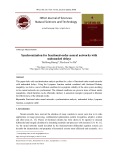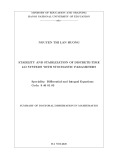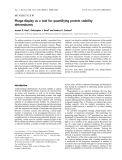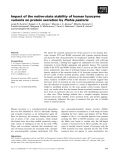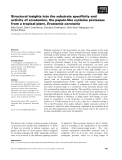
System Stability Analysis
-
This paper deals with synchronization analysis problem for a class of fractional-order neural networks with unbounded delays. Using the Lyapunov function method combined with fractional Halanay inequality, we derive a novel sufficient condition for asymptotic stability of the error system resulting in two neural networks are synchronized.
 9p
9p  viprimi
viprimi
 16-12-2024
16-12-2024
 4
4
 1
1
 Download
Download
-
Lecture "Fundamentals of control systems - Chapter 4: System stability analysis system stability analysis" presentation of content: Stability concept, algebraic stability criteria, root locus method, frequency response analysis.
 72p
72p  doinhugiobay_17
doinhugiobay_17
 04-03-2016
04-03-2016
 70
70
 7
7
 Download
Download
-
Lecture "Fundamentals of control systems - Chapter 8: Analysis of discrete control systems" presentation of content: Stability conditions for discrete systems, extension of Routh - Hurwitz criteria, jury criterion, root locus,... Invite you to reference.
 60p
60p  doinhugiobay_17
doinhugiobay_17
 04-03-2016
04-03-2016
 62
62
 7
7
 Download
Download
-
Objectives: The main objective of this thesis is to study the problem of stability analysis and applications in control of discrete-time 2-D systems described by Roesser model with certain types of stochastic parameters. The research includes the methodology development and establishment of analysis and synthesis conditions of the following specified models.
 120p
120p  thebadguys
thebadguys
 08-06-2021
08-06-2021
 24
24
 4
4
 Download
Download
-
Objectives: The main objectives of this thesis is to study the problem of stability analysis and applications in control of discrete-time 2-D systems described by Roesser model with certain types of stochastic parameters. The research includes the methodology development and establishment of analysis and synthesis conditions of the following specified models.
 27p
27p  thebadguys
thebadguys
 08-06-2021
08-06-2021
 31
31
 4
4
 Download
Download
-
To address questions of protein stability, researchers have increasingly turned to combinatorial approaches that permit the rapid analysis of libraries of protein variants. Phage-displayhasprovedtobeapowerful tool foranalyzingprotein stabilitydue to the large library sizeand the robustnessof the phageparticle toavarietyofdenaturingconditions.
 7p
7p  dell39
dell39
 03-04-2013
03-04-2013
 36
36
 5
5
 Download
Download
-
We report the secreted expression byPichia pastorisof two human lyso-zyme variants F57I and W64R, associated with systemic amyloid disease, and describe their characterization by biophysical methods. Both variants have a substantially decreased thermostability compared with wild-type human lysozyme, a finding that suggests an explanation for their increased propensity to form fibrillar aggregates and generate disease.
 10p
10p  dell39
dell39
 27-03-2013
27-03-2013
 41
41
 4
4
 Download
Download
-
Multiple proteases of the same family are quite often present in the same species in biological systems. These multiple proteases, despite having high homology in their primary and tertiary structures, show deviations in prop-erties such as stability, activity, and specificity.
 14p
14p  media19
media19
 05-03-2013
05-03-2013
 33
33
 4
4
 Download
Download
-
Stability Issues in RNN Architectures Perspective The focus of this chapter is on stability and convergence of relaxation realised through NARMA recurrent neural networks. Unlike other commonly used approaches, which mostly exploit Lyapunov stability theory, the main mathematical tool employed in this analysis is the contraction mapping theorem (CMT), together with the fixed point iteration (FPI) technique. This enables derivation of the asymptotic stability (AS) and global asymptotic stability (GAS) criteria for neural relaxive systems.
 19p
19p  doroxon
doroxon
 12-08-2010
12-08-2010
 107
107
 9
9
 Download
Download







